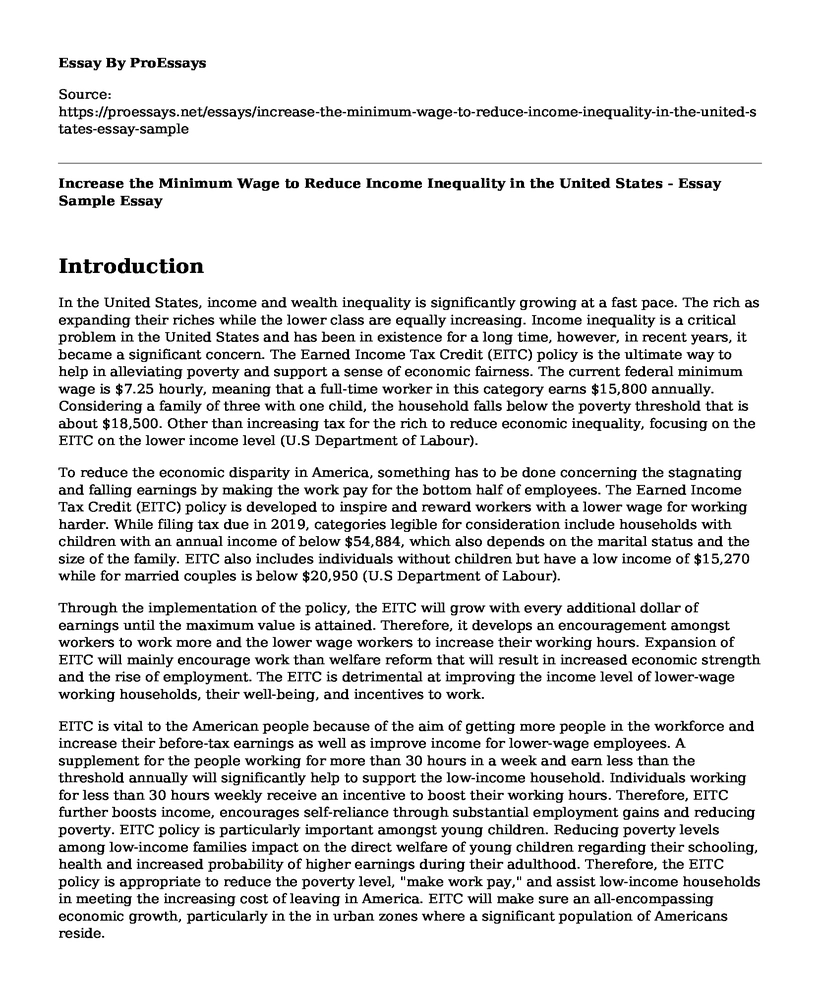Introduction
In the United States, income and wealth inequality is significantly growing at a fast pace. The rich as expanding their riches while the lower class are equally increasing. Income inequality is a critical problem in the United States and has been in existence for a long time, however, in recent years, it became a significant concern. The Earned Income Tax Credit (EITC) policy is the ultimate way to help in alleviating poverty and support a sense of economic fairness. The current federal minimum wage is $7.25 hourly, meaning that a full-time worker in this category earns $15,800 annually. Considering a family of three with one child, the household falls below the poverty threshold that is about $18,500. Other than increasing tax for the rich to reduce economic inequality, focusing on the EITC on the lower income level (U.S Department of Labour).
To reduce the economic disparity in America, something has to be done concerning the stagnating and falling earnings by making the work pay for the bottom half of employees. The Earned Income Tax Credit (EITC) policy is developed to inspire and reward workers with a lower wage for working harder. While filing tax due in 2019, categories legible for consideration include households with children with an annual income of below $54,884, which also depends on the marital status and the size of the family. EITC also includes individuals without children but have a low income of $15,270 while for married couples is below $20,950 (U.S Department of Labour).
Through the implementation of the policy, the EITC will grow with every additional dollar of earnings until the maximum value is attained. Therefore, it develops an encouragement amongst workers to work more and the lower wage workers to increase their working hours. Expansion of EITC will mainly encourage work than welfare reform that will result in increased economic strength and the rise of employment. The EITC is detrimental at improving the income level of lower-wage working households, their well-being, and incentives to work.
EITC is vital to the American people because of the aim of getting more people in the workforce and increase their before-tax earnings as well as improve income for lower-wage employees. A supplement for the people working for more than 30 hours in a week and earn less than the threshold annually will significantly help to support the low-income household. Individuals working for less than 30 hours weekly receive an incentive to boost their working hours. Therefore, EITC further boosts income, encourages self-reliance through substantial employment gains and reducing poverty. EITC policy is particularly important amongst young children. Reducing poverty levels among low-income families impact on the direct welfare of young children regarding their schooling, health and increased probability of higher earnings during their adulthood. Therefore, the EITC policy is appropriate to reduce the poverty level, "make work pay," and assist low-income households in meeting the increasing cost of leaving in America. EITC will make sure an all-encompassing economic growth, particularly in the in urban zones where a significant population of Americans reside.
Cite this page
Increase the Minimum Wage to Reduce Income Inequality in the United States - Essay Sample. (2022, Nov 27). Retrieved from https://proessays.net/essays/increase-the-minimum-wage-to-reduce-income-inequality-in-the-united-states-essay-sample
If you are the original author of this essay and no longer wish to have it published on the ProEssays website, please click below to request its removal:
- Essay Sample on Economic Stagnation in 1970
- Organizations and Globalization Essay Example
- The Great Recession 2007- 2009 Essay Example
- Globalization: Technology, Communication & Power Generation - Essay Sample
- Essential Skills for Canadian Employees: Communication, Info Mgmt, Problem-Solving & More - Essay Sample
- Proposing Action to Enhance Career Planning & Retain Talented Employees - Essay Sample
- Paper on Interns Should Be Paid For Their Work







